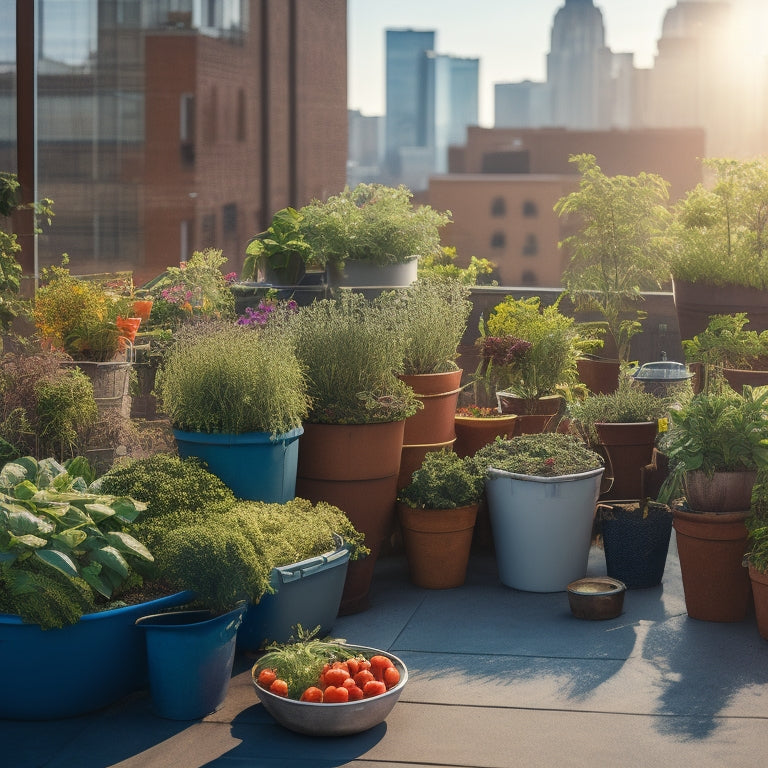
Why Organic Fertilizers Thrive in Rooftop Vegetable Gardens
Share
You've chosen organic fertilizers for your rooftop vegetable garden to guarantee a thriving and sustainable harvest. These fertilizers provide necessary micronutrients and macronutrients, promoting healthy plant growth and maximizing yields. By nourishing microorganisms in the soil, organic fertilizers support a flourishing microbial ecosystem, which transforms organic matter into plant-absorbable forms. Additionally, they improve soil structure and water retention, while offering natural pest control methods. As you continue to care for your garden, you'll discover the many ways organic fertilizers promote a self-sustaining ecosystem, and reveal the full potential of your rooftop sanctuary.
Nutrient-Rich Fertilizer for Rooftop Vegetables
When cultivating a rooftop vegetable garden, you'll want to prioritize using a nutrient-rich fertilizer that provides essential micronutrients and macronutrients to promote healthy plant growth and maximize yields. This is pivotal for sustainable gardening practices, which not only benefit your garden but also contribute to environmental benefits like reduced carbon footprint and increased biodiversity.
Urban agriculture and rooftop farming trends are on the rise, and using a high-quality fertilizer can help you join the movement. A nutrient-rich fertilizer will provide your plants with the necessary building blocks for growth, such as nitrogen, phosphorus, and potassium. It will also supply micronutrients like iron, zinc, and boron, which are essential for plant development.
Organic Matter Feeds Microorganisms
As you provide your rooftop vegetables with a nutrient-rich fertilizer, you're also feeding the microorganisms in the soil, which thrive on organic matter to break down complex compounds and recycle nutrients. This microbial activity is essential for nutrient absorption, as microorganisms convert organic matter into forms that your vegetables can easily absorb. By using organic fertilizers, you're supporting a thriving microbial ecosystem that works in harmony with your plants.
| Microbial Process | Benefit to Vegetables |
|---|---|
| Decomposition of organic matter | Releases nutrients for absorption |
| Nitrogen fixation | Converts atmospheric nitrogen into plant-available forms |
| Solubilization of minerals | Makes minerals more accessible for plant uptake |
Soil Structure and Water Retention
You'll notice that organic fertilizers also enhance soil structure and water retention, enabling your rooftop vegetables to thrive in a well-draining yet moisture-retentive growing medium. By adding organic matter, you're improving soil composition, which in turn optimizes drainage. This guarantees that excess water doesn't accumulate, reducing the risk of waterlogged soil and root rot.
Meanwhile, organic fertilizers also enhance moisture retention, allowing your plants to access water as needed. This is especially vital for rooftop gardens, where wind and sun can quickly dry out the soil.
As a result, your vegetables will experience healthy root growth, which is essential for nutrient uptake and overall plant development. Organic fertilizers promote a balanced soil ecosystem, where microorganisms and beneficial insects work together to break down nutrients and make them available to your plants.
Natural Pest Control Methods
Frequently, rooftop gardeners encounter pests that can devastate their crops, but organic fertilizers also offer natural pest control methods that can help mitigate these issues. By incorporating companion planting into your rooftop garden, you can attract beneficial insects that prey on pests, reducing the need for harsh chemicals.
For instance, planting marigolds alongside tomatoes can deter nematodes, while basil repels aphids and whiteflies. You can also create homemade remedies using organic ingredients like neem oil and garlic to control pest populations.
Additionally, promoting plant diversity in your rooftop garden can disrupt the life cycle of pests, making it harder for them to thrive. By planting a variety of crops together, you're creating a balanced ecosystem where pests are less likely to dominate.
Microbial Balance and Plant Health
In your rooftop vegetable garden, a thriving microbial balance is essential for plant health, as the intricate relationships between microorganisms and plant roots can greatly impact crop yields and resistance to disease.
You see, microbial diversity is vital for plant immunity, as beneficial microorganisms help to fight off pathogens and promote healthy plant growth. When you use organic fertilizers, you're encouraging the growth of these beneficial microorganisms, which in turn boosts your plants' natural defenses.
As you nurture your soil's microbial balance, you'll notice improved nutrient absorption and overall soil health. This is because microorganisms play a key role in breaking down organic matter and making essential nutrients available to your plants.
By fostering a thriving microbial community, you're creating a self-sustaining ecosystem that requires fewer external inputs. This not only benefits your plants but also the environment as a whole.
Frequently Asked Questions
How Often Should I Reapply Organic Fertilizer to My Rooftop Garden?
You'll want to reapply organic fertilizer to your rooftop garden every 2-4 weeks, depending on weather and soil conditions, to maintain best yields and maximize benefits, ensuring your vegetables receive consistent nutrient boosts.
Can I Use Organic Fertilizer on Newly Seeded Rooftop Gardens?
You're wondering if you can use organic fertilizer on newly seeded rooftop gardens - hold your horses! Before applying, wait until seed germination is complete, then follow best practices for a balanced fertilizer schedule to guarantee a thriving harvest.
Are Organic Fertilizers Safe for Pets and Children to Be Around?
You'll rest easy knowing organic fertilizers are generally safer for pets and kids than chemical ones, which can contain toxic substances, but always follow label instructions and take precautions to avoid accidents.
Do Organic Fertilizers Attract More Pests to My Rooftop Garden?
You're wondering if organic fertilizers will attract more pests to your rooftop garden, but don't worry, proper fertilizer application and pest prevention strategies can mitigate this risk, ensuring a thriving and pest-free harvest.
Can I Mix Organic Fertilizer With Synthetic Fertilizers for Better Results?
You can mix organic and synthetic fertilizers, but it's important to understand that organic fertilizers' benefits, like soil enrichment and microbial growth, may be compromised by synthetic additives, potentially offsetting their advantages.
Related Posts
-

Irrigation Solutions for Raised Bed Planters Made Easy
You can optimize your raised bed planters' irrigation system by understanding the complex interplay between soil type...
-

Irrigation Solutions for Raised Bed Planters Made Easy
You can optimize your raised bed planters' irrigation system by understanding the complex interplay between soil type...
-

Irrigation Solutions for Raised Bed Planters Made Easy
You can optimize your raised bed planters' irrigation system by understanding the complex interplay between soil type...
-

Irrigation Solutions for Raised Bed Planters Made Easy
You can optimize your raised bed planters' irrigation system by understanding the complex interplay between soil type...
-

Irrigation Solutions for Raised Bed Planters Made Easy
You can optimize your raised bed planters' irrigation system by understanding the complex interplay between soil type...
-

Irrigation Solutions for Raised Bed Planters Made Easy
You can optimize your raised bed planters' irrigation system by understanding the complex interplay between soil type...
-

Irrigation Solutions for Raised Bed Planters Made Easy
You can optimize your raised bed planters' irrigation system by understanding the complex interplay between soil type...
-

Irrigation Solutions for Raised Bed Planters Made Easy
You can optimize your raised bed planters' irrigation system by understanding the complex interplay between soil type...
-

Irrigation Solutions for Raised Bed Planters Made Easy
You can optimize your raised bed planters' irrigation system by understanding the complex interplay between soil type...
-

Irrigation Solutions for Raised Bed Planters Made Easy
You can optimize your raised bed planters' irrigation system by understanding the complex interplay between soil type...
-

Irrigation Solutions for Raised Bed Planters Made Easy
You can optimize your raised bed planters' irrigation system by understanding the complex interplay between soil type...
-

Irrigation Solutions for Raised Bed Planters Made Easy
You can optimize your raised bed planters' irrigation system by understanding the complex interplay between soil type...
-

Irrigation Solutions for Raised Bed Planters Made Easy
You can optimize your raised bed planters' irrigation system by understanding the complex interplay between soil type...
-

Irrigation Solutions for Raised Bed Planters Made Easy
You can optimize your raised bed planters' irrigation system by understanding the complex interplay between soil type...
-

Irrigation Solutions for Raised Bed Planters Made Easy
You can optimize your raised bed planters' irrigation system by understanding the complex interplay between soil type...
-

Irrigation Solutions for Raised Bed Planters Made Easy
You can optimize your raised bed planters' irrigation system by understanding the complex interplay between soil type...
-

Irrigation Solutions for Raised Bed Planters Made Easy
You can optimize your raised bed planters' irrigation system by understanding the complex interplay between soil type...
-

Irrigation Solutions for Raised Bed Planters Made Easy
You can optimize your raised bed planters' irrigation system by understanding the complex interplay between soil type...
-

Irrigation Solutions for Raised Bed Planters Made Easy
You can optimize your raised bed planters' irrigation system by understanding the complex interplay between soil type...
-

Irrigation Solutions for Raised Bed Planters Made Easy
You can optimize your raised bed planters' irrigation system by understanding the complex interplay between soil type...
-

Irrigation Solutions for Raised Bed Planters Made Easy
You can optimize your raised bed planters' irrigation system by understanding the complex interplay between soil type...
-

Irrigation Solutions for Raised Bed Planters Made Easy
You can optimize your raised bed planters' irrigation system by understanding the complex interplay between soil type...
-

Irrigation Solutions for Raised Bed Planters Made Easy
You can optimize your raised bed planters' irrigation system by understanding the complex interplay between soil type...
-

Irrigation Solutions for Raised Bed Planters Made Easy
You can optimize your raised bed planters' irrigation system by understanding the complex interplay between soil type...
-

Irrigation Solutions for Raised Bed Planters Made Easy
You can optimize your raised bed planters' irrigation system by understanding the complex interplay between soil type...
-

Irrigation Solutions for Raised Bed Planters Made Easy
You can optimize your raised bed planters' irrigation system by understanding the complex interplay between soil type...
-

Irrigation Solutions for Raised Bed Planters Made Easy
You can optimize your raised bed planters' irrigation system by understanding the complex interplay between soil type...
-

Irrigation Solutions for Raised Bed Planters Made Easy
You can optimize your raised bed planters' irrigation system by understanding the complex interplay between soil type...
-

10 Natural Ways to Clean Your Planters
You can transform your planters from grimy to gleaming with these 10 natural cleaning solutions. Mix baking soda and ...
-

10 Natural Ways to Clean Your Planters
You can transform your planters from grimy to gleaming with these 10 natural cleaning solutions. Mix baking soda and ...
-

10 Natural Ways to Clean Your Planters
You can transform your planters from grimy to gleaming with these 10 natural cleaning solutions. Mix baking soda and ...
-

10 Natural Ways to Clean Your Planters
You can transform your planters from grimy to gleaming with these 10 natural cleaning solutions. Mix baking soda and ...
-

10 Natural Ways to Clean Your Planters
You can transform your planters from grimy to gleaming with these 10 natural cleaning solutions. Mix baking soda and ...
-

10 Natural Ways to Clean Your Planters
You can transform your planters from grimy to gleaming with these 10 natural cleaning solutions. Mix baking soda and ...
-

10 Natural Ways to Clean Your Planters
You can transform your planters from grimy to gleaming with these 10 natural cleaning solutions. Mix baking soda and ...
-

10 Natural Ways to Clean Your Planters
You can transform your planters from grimy to gleaming with these 10 natural cleaning solutions. Mix baking soda and ...
-

10 Natural Ways to Clean Your Planters
You can transform your planters from grimy to gleaming with these 10 natural cleaning solutions. Mix baking soda and ...
-

10 Natural Ways to Clean Your Planters
You can transform your planters from grimy to gleaming with these 10 natural cleaning solutions. Mix baking soda and ...
-

10 Natural Ways to Clean Your Planters
You can transform your planters from grimy to gleaming with these 10 natural cleaning solutions. Mix baking soda and ...
-

10 Natural Ways to Clean Your Planters
You can transform your planters from grimy to gleaming with these 10 natural cleaning solutions. Mix baking soda and ...
-

10 Natural Ways to Clean Your Planters
You can transform your planters from grimy to gleaming with these 10 natural cleaning solutions. Mix baking soda and ...
-

10 Natural Ways to Clean Your Planters
You can transform your planters from grimy to gleaming with these 10 natural cleaning solutions. Mix baking soda and ...
-

10 Natural Ways to Clean Your Planters
You can transform your planters from grimy to gleaming with these 10 natural cleaning solutions. Mix baking soda and ...
-

10 Natural Ways to Clean Your Planters
You can transform your planters from grimy to gleaming with these 10 natural cleaning solutions. Mix baking soda and ...
-

10 Natural Ways to Clean Your Planters
You can transform your planters from grimy to gleaming with these 10 natural cleaning solutions. Mix baking soda and ...
-

10 Natural Ways to Clean Your Planters
You can transform your planters from grimy to gleaming with these 10 natural cleaning solutions. Mix baking soda and ...
-

10 Natural Ways to Clean Your Planters
You can transform your planters from grimy to gleaming with these 10 natural cleaning solutions. Mix baking soda and ...
-

10 Natural Ways to Clean Your Planters
You can transform your planters from grimy to gleaming with these 10 natural cleaning solutions. Mix baking soda and ...
-

10 Natural Ways to Clean Your Planters
You can transform your planters from grimy to gleaming with these 10 natural cleaning solutions. Mix baking soda and ...
-

10 Natural Ways to Clean Your Planters
You can transform your planters from grimy to gleaming with these 10 natural cleaning solutions. Mix baking soda and ...
-

10 Natural Ways to Clean Your Planters
You can transform your planters from grimy to gleaming with these 10 natural cleaning solutions. Mix baking soda and ...
-

10 Natural Ways to Clean Your Planters
You can transform your planters from grimy to gleaming with these 10 natural cleaning solutions. Mix baking soda and ...
-

10 Natural Ways to Clean Your Planters
You can transform your planters from grimy to gleaming with these 10 natural cleaning solutions. Mix baking soda and ...
-

10 Natural Ways to Clean Your Planters
You can transform your planters from grimy to gleaming with these 10 natural cleaning solutions. Mix baking soda and ...
-

10 Natural Ways to Clean Your Planters
You can transform your planters from grimy to gleaming with these 10 natural cleaning solutions. Mix baking soda and ...
-

10 Natural Ways to Clean Your Planters
You can transform your planters from grimy to gleaming with these 10 natural cleaning solutions. Mix baking soda and ...
-

10 Natural Ways to Clean Your Planters
You can transform your planters from grimy to gleaming with these 10 natural cleaning solutions. Mix baking soda and ...
-

10 Natural Ways to Clean Your Planters
You can transform your planters from grimy to gleaming with these 10 natural cleaning solutions. Mix baking soda and ...
-

10 Natural Ways to Clean Your Planters
You can transform your planters from grimy to gleaming with these 10 natural cleaning solutions. Mix baking soda and ...
-

10 Natural Ways to Clean Your Planters
You can transform your planters from grimy to gleaming with these 10 natural cleaning solutions. Mix baking soda and ...
-

10 Natural Ways to Clean Your Planters
You can transform your planters from grimy to gleaming with these 10 natural cleaning solutions. Mix baking soda and ...
-

10 Natural Ways to Clean Your Planters
You can transform your planters from grimy to gleaming with these 10 natural cleaning solutions. Mix baking soda and ...
-

10 Natural Ways to Clean Your Planters
You can transform your planters from grimy to gleaming with these 10 natural cleaning solutions. Mix baking soda and ...
-

What to Seal Your Planters With for Longevity
When sealing your planters for longevity, it's vital to choose a sealant compatible with your planter material - whet...
-

What to Seal Your Planters With for Longevity
When sealing your planters for longevity, it's vital to choose a sealant compatible with your planter material - whet...
-

What to Seal Your Planters With for Longevity
When sealing your planters for longevity, it's vital to choose a sealant compatible with your planter material - whet...
-

What to Seal Your Planters With for Longevity
When sealing your planters for longevity, it's vital to choose a sealant compatible with your planter material - whet...
-

What to Seal Your Planters With for Longevity
When sealing your planters for longevity, it's vital to choose a sealant compatible with your planter material - whet...
-

What to Seal Your Planters With for Longevity
When sealing your planters for longevity, it's vital to choose a sealant compatible with your planter material - whet...
-

What to Seal Your Planters With for Longevity
When sealing your planters for longevity, it's vital to choose a sealant compatible with your planter material - whet...
-

What to Seal Your Planters With for Longevity
When sealing your planters for longevity, it's vital to choose a sealant compatible with your planter material - whet...
-

What to Seal Your Planters With for Longevity
When sealing your planters for longevity, it's vital to choose a sealant compatible with your planter material - whet...
-

What to Seal Your Planters With for Longevity
When sealing your planters for longevity, it's vital to choose a sealant compatible with your planter material - whet...
-

What to Seal Your Planters With for Longevity
When sealing your planters for longevity, it's vital to choose a sealant compatible with your planter material - whet...
-

What to Seal Your Planters With for Longevity
When sealing your planters for longevity, it's vital to choose a sealant compatible with your planter material - whet...
-

What to Seal Your Planters With for Longevity
When sealing your planters for longevity, it's vital to choose a sealant compatible with your planter material - whet...
-

What to Seal Your Planters With for Longevity
When sealing your planters for longevity, it's vital to choose a sealant compatible with your planter material - whet...
-

What to Seal Your Planters With for Longevity
When sealing your planters for longevity, it's vital to choose a sealant compatible with your planter material - whet...
-

What to Seal Your Planters With for Longevity
When sealing your planters for longevity, it's vital to choose a sealant compatible with your planter material - whet...
-

What to Seal Your Planters With for Longevity
When sealing your planters for longevity, it's vital to choose a sealant compatible with your planter material - whet...
-

What to Seal Your Planters With for Longevity
When sealing your planters for longevity, it's vital to choose a sealant compatible with your planter material - whet...
-

What to Seal Your Planters With for Longevity
When sealing your planters for longevity, it's vital to choose a sealant compatible with your planter material - whet...
-

What to Seal Your Planters With for Longevity
When sealing your planters for longevity, it's vital to choose a sealant compatible with your planter material - whet...
-

What to Seal Your Planters With for Longevity
When sealing your planters for longevity, it's vital to choose a sealant compatible with your planter material - whet...
-

What to Seal Your Planters With for Longevity
When sealing your planters for longevity, it's vital to choose a sealant compatible with your planter material - whet...
-

What to Seal Your Planters With for Longevity
When sealing your planters for longevity, it's vital to choose a sealant compatible with your planter material - whet...
-

What to Seal Your Planters With for Longevity
When sealing your planters for longevity, it's vital to choose a sealant compatible with your planter material - whet...
-

What to Seal Your Planters With for Longevity
When sealing your planters for longevity, it's vital to choose a sealant compatible with your planter material - whet...
-

What to Seal Your Planters With for Longevity
When sealing your planters for longevity, it's vital to choose a sealant compatible with your planter material - whet...
-

What to Seal Your Planters With for Longevity
When sealing your planters for longevity, it's vital to choose a sealant compatible with your planter material - whet...
-

What to Seal Your Planters With for Longevity
When sealing your planters for longevity, it's vital to choose a sealant compatible with your planter material - whet...
-

What to Seal Your Planters With for Longevity
When sealing your planters for longevity, it's vital to choose a sealant compatible with your planter material - whet...
-

What to Seal Your Planters With for Longevity
When sealing your planters for longevity, it's vital to choose a sealant compatible with your planter material - whet...
-

What to Seal Your Planters With for Longevity
When sealing your planters for longevity, it's vital to choose a sealant compatible with your planter material - whet...
-

What to Seal Your Planters With for Longevity
When sealing your planters for longevity, it's vital to choose a sealant compatible with your planter material - whet...


